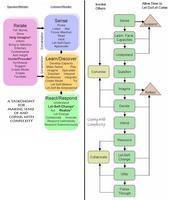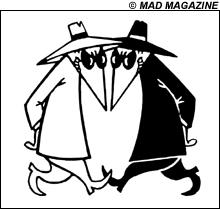| Wednesday, January 24, 2007 |
| Collective Capacities |
 Dave Pollard talks about how we need different types to build functional communities: Dave Pollard talks about how we need different types to build functional communities:If we're going to save the world and stuff, we're going to need to bring some diverse skills and capacities to bear. The two models above, which come from these posts last year, suggest what these needed skills and capacities might be.It is a puzzle. We tend to associate more with people who sort of work the same way as us than with the people who have complementary capacities to us. Like Dave, if I gathered the people I hang out with (not that I hang out very much), it would tend to be intellectual thinkers, philosophers, visionaries, maybe smart and interesting people, but also people who might be rather incapable in doing many very practical things. If I was going to be stranded on a desert island, I'd be dumb to plan to bring my kind of people. Oh, we'd need my kind of people, but we'd certainly also need very different kinds of people, more practical, more direct, with instincts for getting certain things done that are different from mine. I find different people interesting. I love diversity. I understand that different approaches complement each other, and that's a good thing. But, yet, I don't necessarily create structures like that around me. I don't make sure that I have a community of different types of people around, who might disagree with me, but in good ways. They might see things I don't, naturally do things I'd miss. But somehow we don't naturally create that. It might emerge because we incidentally live next to some different people, or we're born into the same family, or because we're hired to fulfill different functions in a company. But why don't we do it by ourselves? [ Culture | 2007-01-24 19:57 | 5 comments | PermaLink ] More > |
| Assuming Somebody Else's Viewpoint |
 Merlin Silk writes about viewpoints, starting with the well-known concept of toddler's property rights: Merlin Silk writes about viewpoints, starting with the well-known concept of toddler's property rights:"All the toys are mine. If they are broken you can have them - but the pieces are mine!"And Gunter had a short comment. The thing is, is it always right to try to assume other people's viewpoints. I know I do it. I often bend over backwards to try to see everybody's viewpoint. Which I suppose is a noble thing to try to do. Might make you a good diplomat. But possibly it also makes things complicated in terms of getting something done. You sort of have to second-guess what everybody thinks, and try to find the optimum solution for everybody concerned. I sometimes get intrigued by or even attracted to people who don't work that way at all. People who only focus on what they want, what they're sure is right, possibly even without any kind of logical rationale, but merely an emotional certainty that they ought to do what they want to do. I find it a little puzzling that people like that even can exist. That they don't get themselves killed every other week. But sometimes it is those people who're more effective in many ways than I am, getting things done, because the world is more simple to them. I was in this improv theatre group years ago. Very useful to get me out of my head. I loved the people in it, but they were all different from me. If there was any kind of discussion about something, I would as usual bring forward well considered logical arguments for one thing or another. And I'd quickly notice that nobody was listening to them, because it didn't matter to them at all. These were more emotional people. Different things made them tick, like stuff that made them feel something. Which I learned to appreciate. So, *should* one consider other people's viewpoints? I guess it is a good thing to be able to, to aim for as much harmony as possible. But one probably also needs to realize that it is a little futile, that you never completely can see it somebody else's way. So, sometimes the more effective thing to do is to get really clear on what *your* way is, to make sure you really are in integrity with it, and then go for it. I mean, who else is gonna go for your thing other than you? [ Thoughts | 2007-01-24 20:42 | 4 comments | PermaLink ] More > |